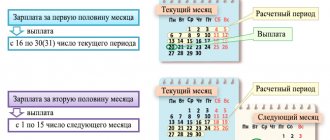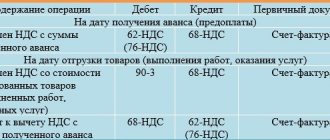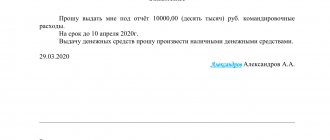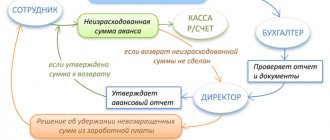What is an advance
The main document that regulates the relationship between employer and employees is the Labor Code of the Russian Federation. But the concept of “advance” is not directly spelled out in it.
The need to pay wages in installments follows from the requirements of Art. 136 Labor Code of the Russian Federation. The law stipulates that employees must receive remuneration at least every half month.
More often than not, no one forbids it. In theory, an employer could pay employees weekly or even daily. But this is associated with unnecessary costs and hassle, so in most cases businessmen limit themselves to complying with the requirements of the law - i.e. Divide the monthly payment into two parts.
The first part, which the employee receives during the pay period, is traditionally called an advance.
What are we talking about?
Russian labor legislation does not contain the concept of “advance payment”.
However, this term is widely used among the people. Advance payment is the salary due to the employee for the first half of the month or other billing period. In simple words, the Labor Code of the Russian Federation establishes the obligation of the employer to pay wages to hired employees at least twice a month. Consequently, the advance payment is earnings for the first half of the billing period, and the remaining amount is the final payment.
When to pay an advance
The employee must receive the final payment by the 15th of the next month. The advance payment date must be two weeks earlier. This means, if we do not consider February - from 16 to 30 or from the 17 to 31 of the current month.
However, it must be taken into account that if the advance is issued on the 16th-17th, then the salary must be paid immediately at the beginning of the next month. Calculating it so quickly can be difficult, especially in large enterprises.
It is possible to issue an advance on the last day of the month, but then problems with the tax authorities may arise. We'll tell you more about this below.
It turns out that it is most convenient to issue an advance in the period from 20 to 29 or until the 30th. The more time it takes accountants to calculate salaries, the later they need to set the date for payment of the first part of the remuneration.
The date of payment must be recorded in the company’s internal documents or in the employment contract. You cannot set a “floating” date, for example: from the 20th to the 25th (letter of the Ministry of Labor dated November 28, 2013 No. 14-2-242).
It is not prohibited to issue an advance before the due date. But you should remember that you will have to “move up” the salary payment date in order to maintain the two-week interval. Those. it is necessary to take into account whether the accounting employees will be able to summarize the results of the month in a shorter time.
Advance and terms of its payment
The Labor Code of the Russian Federation does not contain a definition of the concept of “advance payment”. However, the analysis of Art. 129 and 136 of the Labor Code of the Russian Federation allows us to conclude that the advance is wages for the first half of the month.
According to the law, wages are paid every half month, and the period between the date of accrual and the date of payment of wages cannot exceed 15 days (Article 136 of the Labor Code of the Russian Federation).
This means that the employee must receive his salary for the first half of the month on any day between the 16th and 30th (31st) of the current month. Conventionally, this will be considered an advance. For the second half of the month, the employer is obliged to pay the employee from the 1st to the 15th of the next month.
The specific date for the payment of wages must be established and fixed in a local regulatory act, collective or labor agreement. In order to plan financial flows, organizations can set different paydays for employees of different structural divisions (for example, workers should be paid on the 13th and 28th, and administrative personnel on the 10th and 25th).
The employer must pay the advance no later than the last day of the paid month (Article 136 of the Labor Code of the Russian Federation, letter of the Ministry of Labor dated February 14, 2017 No. 14-1/OOG-1293, letter of Rostrud dated September 26, 2016 No. TZ/5802-6-1).
If the period between payments exceeds 15 days due to the fact that the payment deadlines fall on non-working holidays, this will not be considered a violation.
Example
The organization has established a deadline for the payment of advance payments - the 27th day of the billing month and a deadline for paying wages - the 12th day of the next month.
November 12, 2022 is a public holiday.
Therefore, wages for October should be paid to employees on the last working day before the holidays, that is, November 9, 2022.
In this case, the organization will pay the wage advance on November 27, 2022, 18 days after the payment of wages.
Since in this case the organization made payments to employees in compliance with all the requirements of the law, deviation from the frequency of payments cannot be considered a violation of the Labor Code of the Russian Federation.
How much to pay
The algorithm for calculating the advance amount is not specified in the Labor Code, so here you have to rely on the explanations of the regulatory authorities. Officials believe that you need to pay in proportion to the time worked or actual output (letters from Rostrud dated 09/08/2006 No. 1557-6 and the Ministry of Labor dated 08/10/2017 No. 14-1/B-725).
In addition to piece rates or salaries, officials recommend including “current” allowances in the advance payment, i.e. those additional payments that are not related to summing up the results of the month, for example: for length of service, combining positions, etc.
But bonuses for fulfilling the monthly plan, additional payments for overtime when recording working hours together and other similar payments can be determined only after the period is closed. Therefore, they should not participate in the calculation for the first half of the month.
In practice, it is difficult to count the actual time worked or output twice a month for each employee, especially in medium and large companies. Therefore, most often the advance is set as a percentage of the salary or average monthly output for piecework payment. The most common payout is 40%-45%. The fact is that in general, personal income tax is not withheld from the advance payment. Those. the entire tax amount is deducted from the issued salary during the final settlement. And if you pay half of the monthly remuneration during the period, then the second payment will be significantly less.
Let's move on to the advance payment and its size
Let us note right away that there is a gap in labor legislation. There is no concept of "advance". However, the Tax Code of the Republic of Belarus talks about remuneration for the first half of the period, which in practice is called an advance.
The volume in Belarus is not regulated. Typically, the employer does this based on his own considerations, providing for the corresponding condition in the collective and also in the employment contract. Remember that in the tariff. agreements may establish a limit on the amount of such payment.
How exactly can the amount of the advance be determined?
- As a percentage of the existing salary.
- In a fixed amount of money.
Please note that it is not necessary for these numbers to be equal across employees. Someone can receive 200 rubles, and others - 120. Moreover, a combination of approaches is allowed (percentage for one, fixed rate for another).
Accounting Technologies LLC does not recommend creating conditions in which the payment of an advance represents a transfer of more than 50% of the salary. The reason is that this can be regarded as the issuance of a loan during verification. As a result, there are questions regarding income tax withholding.
Example 1
Salary of accountant I.V. Petrova is 50,000 rubles, she does not use personal income tax deductions. Then the amount of tax withheld will be 50,000 x 13% = 6,500 rubles. If you pay an advance in the amount of 50% of the salary, i.e. 25,000 rubles, then the amount at the end of the month will be 50,000 – 25,000 – 6,500 = 18,500 rubles. With a 40% standard, payments will be more balanced:
Advance: 50,000 x 40% = 20,000 rub.
Salary: 50,000 – 6,500 – 20,000 = 23,500 rubles.
However, a situation is possible when the employee was on vacation during the first half of the month, which means he has already received payment for this period. Then, when the first part is paid in the amount of the “standard” 40% of the salary, the second part will be minimal, or even an overpayment may result.
Therefore, the best option for determining the amount of the advance would be a combined one: the payment is calculated as 40-45% of the salary, but taking into account the actual time worked.
Example 2
Let's assume that there are 20 working days in the billing month. Petrova I.V. I was on vacation from 01 to 07 and worked in the first half of the month not 10, but 5 days. Then the advance for her will be set in the amount: 50,000 x 40% / 10 x 5 = 10,000 rubles.
Total accrued amount for the month (without vacation pay): 50,000 / 20 x 15 = 37,500 rubles.
Personal income tax = 37,500 x 13% = 4,875 rubles.
Payment at the end of the month: 37,500 – 10,000 – 4,875 = 22,625 rubles.
As you can see, the amount of the final payment is almost no different from the option considered in example 1.
Obligatory payments
In general, there is no need to pay personal income tax on the advance payment. After all, income in the form of wages is considered received only at the end of the billing period.
But if the advance payment date is set on the last day of the month, then the employee’s income from a tax point of view has already been generated. Therefore, officials believe that in this case the employer has an obligation to pay personal income tax (letter of the Ministry of Finance of the Russian Federation dated November 23, 2016 No. 03-04-06/69181).
Insurance premiums are also calculated at the end of the month based on all payments accrued during the period in favor of employees.
Therefore, to avoid controversial situations, do not schedule an advance payment on the last day of the month.
What deadlines does the Labor Code establish for paying advances on wages?
Employees must receive payment for their work at least every half month - this is regulated by Part 6 of Art. 136 Labor Code of the Russian Federation. Moreover, the advance payment for two-time payment of remuneration for labor is issued from the 16th to the 30th (31st) day of the current month, and the deadline for transferring the final salary amount will be the 15th day of the month following the billing month.
IMPORTANT! Failure to comply with the requirement not to exceed the maximum number of days between payments of the first and second parts of the salary may be grounds for labor inspectors to impose a fine of 50,000 rubles. (Article 5.27 of the Code of Administrative Offenses of the Russian Federation).
You have the right to choose the dates for issuing the advance payment and salary yourself, having specified them in the collective or employment agreement, as well as in the internal regulations. When determining these dates, the following must be considered:
- It is prohibited to provide for a date interval for payments of any part of the salary. For example, from the 15th to the 18th. According to Art. 136 of the Labor Code of the Russian Federation, specific dates must be approved.
- You cannot write ambiguous wording, for example, something like this: “salaries are paid no later than the 12th and 27th of each month.” After all, then it is unclear exactly what date the advance payment will be transferred, and what date the final payment will be transferred. In addition, this phrase cannot be used to determine the specific date of payment to employees.
- Before approving the terms, analyze the requirements of the Tax Code of the Russian Federation: if you specify the 15th day of final payment, then the advance payment is automatically shifted to the 30th (31st). According to paragraph 2 of Art. 223 of the Tax Code of the Russian Federation and the decision of the Supreme Court of the Russian Federation dated May 11, 2016 No. 309-KG16-1804 from the advance paid to employees on the last day of the month, personal income tax will need to be withheld. This means that in months with 30 days this requirement will have to be met when calculating advances, but in months with 31 days it will not. This situation will create confusion and additional difficulties for both accountants and inspectors.
Read about how to calculate personal income tax in this article.
Do I need to pay insurance premiums on salary advances? The answer to this question was given by 1st Class Advisor to the State Civil Service of the Russian Federation E. B. Balandina. Get free trial access to the ConsultantPlus system and get acquainted with the official’s point of view.
IMPORTANT! If the day the money is transferred falls on a non-working day (weekend or holiday), then the salary should be paid the day before, even if the employee went on vacation. (Part 8 of Article 136 of the Labor Code of the Russian Federation).
Conclusion
An advance is a mandatory payment, the need for which arises from the requirement of the Labor Code of the Russian Federation to pay remuneration to employees twice a month.
Employers can determine the date of issue and the amount of the advance themselves, but taking into account the restrictions established by the Labor Code of the Russian Federation and the recommendations of regulatory authorities.
It is most convenient to set the date for issuing the advance from the 20th to the 29th, and the amount - in the amount of 40-45% of the monthly remuneration, taking into account the actual time worked for the first half of the month.






